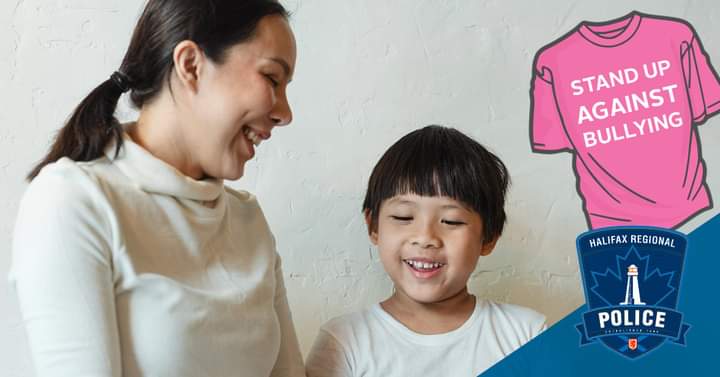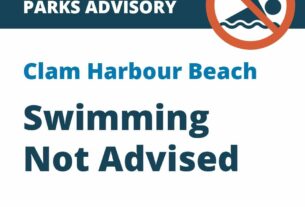**** HRP Media Release
National Pink Shirt Day is this month. Consider having a conversation about bullying with your child. Listening provides reassurance that being the victim of bullying is not a child’s fault.
Tips to deal with bullying
Bullying has a negative impact on families in our communities. Here are a few tips and ideas that can help parents, guardians, children and youth deal with bullying:
Tips for children dealing with a bully
- Get help by telling your parents or guardians right away. They will help you and find more support as needed.
- Tell the school through a teacher, principal or guidance counsellor.
- Always tell a friend or an adult you trust about the bullying. Having someone on your side will help you stand up for yourself.
- Practice ‘walking tall’ with shoulders back and head held high.
- Ignore the bully or say “NO” and walk away. Bullies are often seeking attention. If you act like you don’t care, the bully might get bored and give up. The most dangerous thing you can do when confronted by a bully is fight back. Bullies are generally stronger than their victims.
- Give up your possessions. If the situation is dangerous, if the bully is bigger and stronger than you, or if they have a weapon, then it would be smart to give them what they want. Material things can be replaced. You or an adult should then contact police at 902-490-5020. Call 911, when immediate action is required: someone’s health, safety or property is in jeopardy or a crime is in progress. In-progress is defined as currently happening, the suspect may still be in the area and/or the victim may still be in danger.
- Stick with a group. Try not to be alone in places where you could be unsafe – an empty schoolyard, a dark alleyway or a school washroom.
Signs that a child or youth is being bullied
You should be concerned if the child or youth:
- is frightened of walking to or from school
- is unwilling or worried to go to school
- is adamant about the need to be driven or escorted to school or changes their route to school
- begins to do poorly in school
- comes home regularly with belongings destroyed or missing
- has unexplained cuts or bruises
- becomes withdrawn, distressed, anxious or begins to lose sleep
What to do if a child or youth is being bullied
- listen and be supportive – take bullying seriously
- reassure your child/youth that it isn’t their fault
- ask how they’ve been dealing with the bullying
- talk about what actions you can both take to solve the problem
- promise to consult your child/youth before taking any action
- talk to school administrators and ask what they can do to help
- help your child/youth develop a list of trusted adults they can call/text or go to for help
- arrange to meet your child/youth if the bullying is happening on the way to or from school
- consider enlisting the help of a professional
What to do if your child is a bully
- stay calm
- try to find out why your child is behaving this way
- explain that bullying is wrong and try to get your child to understand what it’s like for the victim
- talk about how your child might stop bullying and show them how to get along with others without bullying
- praise your child when they interact appropriately with others
- set realistic, firm guidelines to help your child control behaviour
- talk with a teacher, guidance counsellor or principal at your child’s school
- model good behaviour at home
- enlist the help of a professional
Protect children from cyberbullying
There are steps you can take to help protect youth and children from cyberbullying:
- encourage your child to speak up. If someone sends them a text, tweet or email that makes them uncomfortable they should TELL SOMEONE THEY TRUST (family member, teacher, friend).
- control your child’s online presence
- increase your child’s security settings online
- show them how to hide or deactivate their profile and/or block users. This can be done through the setting options on social networking sites like Snapchat, Instagram, Twitter, Facebook
- save the evidence. As hurtful as it may be, save offending messages, pictures or copies of conversations. This can be used by authorities during investigations
- report serious forms of cyberbullying to teachers, principals, police
- if you’re a victim of cyberbullying contact CyberScan at 855-702-8324 to find out the supports that are available to you




